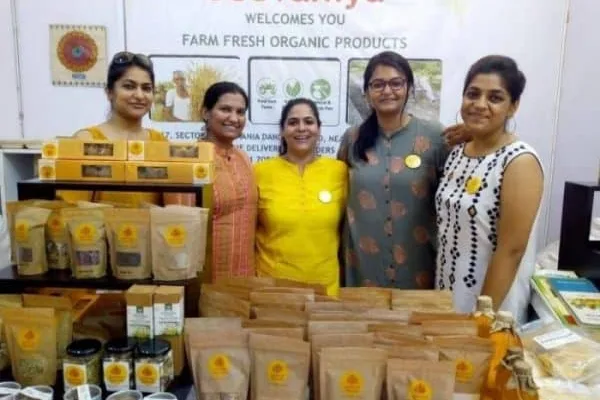Deepti Mehrotra, the founder of Jeevaniya Naturals enthusiastically supports No Sir No Madam initiative. Jeevaniya Naturals has grown from the experience of Jeevaniya Society, which has worked for promotion of traditional Indian health and farming systems. Jeevaniya Society has trained and empowered hundreds of farmers to use organic and traditional methods for farming for over three decades.
Deepti, a social scientist, has received her master’s degree in Philosophy from the esteemed Jawaharlal Nehru University (JNU), Delhi. Furthermore, she is a certified Project Management expert and has more than 5 years of experience working in public health and education industry.
She quit her lavish job and went back home, to Lucknow, to help her father in building and promoting a strong supply-chain network for organic farmers by marketing and creating awareness about their products.
Her work experience has been mainly with startups. As a result, she never had to face the problem of addressing seniors with a salutation. She however remembers, using ‘Sir/Madam’ to refer to elderly people or clients to avoid offending them.
Deepti states — Since we are now located in Lucknow, my employees and I use vernacular terms like ‘didi’ or ‘bhaiya’ to communicate with each other. I keep pushing my employees to address me by my name, however, out of respect they continue to refer to me as ‘didi’. So even I use the same local terms to interact with them and feel that is a better alternative to ‘Sir/Madam’ tradition.
Deepti adds “No Sir No Madam habit takes away any unwanted tension between the employee and the boss. It is not like an employee-boss relation, more like a colleague connection. There will be hierarchy based on experience; however there will be no power differential that comes because of salutation mandate.”
‘Sir/Madam’ custom is practiced by everyone in India, willingly or unwillingly. Nevertheless, one does not have any option when interacting with a government employee.
In her career, she even had the opportunity of working with public sector officials. Deepti mentions — “‘Sir/Madam’ tradition is much more prevalent in government offices. It is an absolute sacrilege to address a government employee by their first-name. I remember the officers would not respond if you referred to them without a salutation. I ensure to address even the peons and assistants with a salutation in order to avoid offending them.”
She continues, “Moreover I think No Sir No Madam initiative can help in reducing corruption. As corruption is about status quo, where the person in authority demands to have their ego caressed to approve your work. No Sir No Madam ideology can help in eradicating that power differential and definitely help in reducing ill-practices.”
Implementing No Sir No Madam theory can be done successfully if we are accustomed it from the beginning. It would be easier for people to understand its importance if instilled in schools and colleges.
Deepti shares — in my college days, there were some professors who would allow us to address them by their first-name. This would elevate the respect you already had for them. As when you get to interact with your teachers and professors on a first-name basis, there are no inhibitions. You can have an open-discussion and have your doubts cleared.
Additionally, she encourages everyone to use vernacular terms like ‘didi’, ‘bhaiya’, ‘chacha’, ‘chachi’, etc. when interacting with people. You will do good and it also adds a personal connection, when interacting with anyone.
In the end, Deepti remarks “If you expect people to address you with a salutation, you will have to refer to someone else with a salutation too. So keep in mind the harms of ‘Sir/Madam’ mandate when you impose it on someone else.”







Add comment